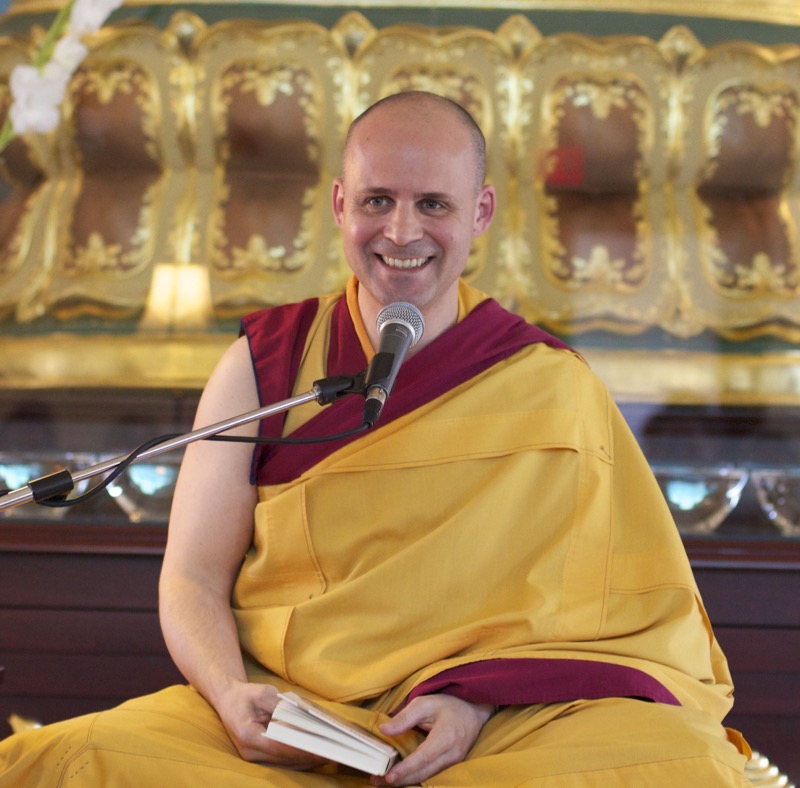
[caption id="attachment_42398" align="alignnone" width="800"] Gen Jampa will give a lecture this Friday at the Unitarian Meetinghouse in Bridgehampton. [/caption]
Gen Jampa will give a lecture this Friday at the Unitarian Meetinghouse in Bridgehampton. [/caption]
By Tim Sommer
Twenty-five hundred years ago, Gautama Buddha asked himself many difficult questions about impermanence, suffering, and unhappiness. He sensed the answers could be found within him, and not in a belief in a higher power or the temporary pleasures of material goods. As a result, he developed a science to access inner peace. Devastatingly beautiful in its’ simplicity and logic, it anticipated developments in physics and psychology which were not to be discovered for another two millennia. The results of this man’s investigative methods have engaged the world and are available to us, requiring only the willingness to listen to your heart and investigate the workings of your mind, your world, and your reality.
Since 2001, the Vajravarahi Buddhist Meditation Center in Sag Harbor has been helping people learn about this ancient science, and providing instruction in the art of mediation.
This Friday, renowned Buddhist teacher and mediation master Gen Jampa will be giving a talk at the Unitarian Church in Bridgehampton. Admission is free and the event is open to all members of the public. Gen Jampa, who studied directly under one of the last centuries’ most loved and respected teachers, Venerable Geshe Kelsang Gyatso, will explain the value of mediation, along with providing practical instruction for anyone curious about meditation, absolutely regardless of your level of experience.
“Meditation is something that can help everyone,” notes Gen Norden, a Buddhist nun and the teacher-in-residence at Sag Harbor’s Vajravarahi Meditation Center, the organization that invited Gen Jampa to the East End. “Meditation is a method for gaining control over our own mind and developing inner peace. Happiness is an inner quality, not an outer situation, object or accomplishment. Meditation is good for everyone. Anyone can learn to meditate. With some simple but clear and authentic instructions, like those Gen Jampa will be giving this weekend, and just five or ten minutes a day you can develop a rewarding and effective meditation practice that will have an impact on the quality of your mind and your experience of life.”
Gen Jampa is the resident teacher at the Kadampa Meditation Center Texas, and the U.S. National Spiritual Director for the New Kadampa Tradition, which was formed by Kelsang Gyatso in 1991. At age 84, Kelsang Gyatso is no longer travelling, which underlines the value of having students who studied directly under him, like Gen Jampa, available to us. Now, what exactly does Kadampa mean?
“The word Kadampa was coined about a thousand years ago,” Gen Norden explains, “and means someone who takes all of Buddha's teachings and puts them into practice in their daily lives. It is a very practical Buddhist tradition that fits naturally into modern Western society. One previous Kadampa teacher, Geshe Chekawa, likened the teachings to a diamond – that is to say, unlike many other valuable things, like say a piece of electronics or a painting, not only is the whole object valuable, but if you break it into pieces, no matter how tiny the piece, each fragment of a diamond is also valuable in its own right. In the same way, if you take all of the Kadampa Buddhist teachings you have the path to enlightenment, but even if you take just one fragment, such as a single meditation on patience or a teaching on compassion towards animals, you have something of great value and meaning that will practically affect the quality and happiness of a persons life.”
Like many modern Buddhist masters, New Kadampa founder Kelsang Gyatso was born in Tibet, and compelled to leave the land of his birth in 1959, following the Chinese invasion and occupation of Tibet. Although this was a tragedy for those living in the ancient land of the Dalai Lamas, the diaspora of Buddhist masters was conducive to a renaissance of Buddhist awareness and learning all over the world. Kelsang Gyatso, who has written some fundamental and easy-to-understand books about Buddhism that helped spread these Eastern ideas to America, first came to the West in the 1970s.
“He has established over 1100 meditation centers and groups and written twenty one books on Buddhism and meditation, from in-depth philosophical studies to the most clear and practical advice on meditation and Buddhist psychology in daily life,” says Gen Norden. “These teachings form the basis of the classes and programs offered at Vajravarahi Center.”
It is in this way that the lineage of thousands of years of Tibetan Buddhist study and knowledge remains alive in Sag Harbor and the East End.
“As the resident teacher, I have thoroughly enjoyed teaching Buddhism and meditation at Vajravarahi Center and living on the East End,” Gen Norden says. “I have found the local community in Sag Harbor to be especially welcoming towards me – as a Buddhist nun, I look a little different – and has also shown a great deal of support towards the Buddhist meditation center being here. Our main ‘drop-in’ meditation class is on Sunday mornings at 10.30 a.m. Everyone is welcome. In the summers we also offer a guided meditation on Sunday evenings at John Seelye's One Ocean Yoga tent at Channing Daughters vineyard, which is such a lovely, beautiful setting, and as with most of our activities, is open to the public.
Visiting Buddhist monk Gen Jampa will give a talk on Meditation and Modern Buddhism on Friday, August 14, from 6 to 7:15 p.m. at the Unitarian Church, 977 Sag Harbor Turnpike in Bridgehampton. Admission is free. For more information or to reserve a seat, go to hamptonsmeditation.org/events.